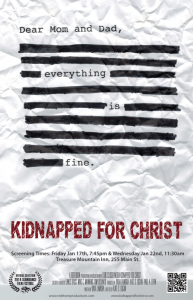Film Review: Kidnapped for Christ

Does your child ever lie or have anxiety issues? Does your child often get into fights? Perhaps you are worried that your child might be gay. Well, all of these “troubling conditions” are curable if you’re willing to have your child forcibly removed from your home and shipped off to a Christian boarding school in the Caribbean that will surely scar your child for life, disrupt their schooling, and take away much hope of leading a somewhat normal life.
I was intrigued when I saw a trailer for the 2014 documentary Kidnapped for Christ. I wasn’t exactly sure what to expect, but after reading the storyline I knew it couldn’t be good. The documentary follows a young film student named Kate Logan. She grew up as an Evangelical Christian in a family of liberals and non-believers and saw her belief as a way to rebel. Kate decided to visit a Christian boarding school in Escuela Caribe, Dominican Republic, as a school film assignment. What she learned from her visit would be shocking, and even cause her to question her own faith.
The Escuela Caribe boarding school was founded in the 1970’s by New Horizon Ministries, using “culture shock” to reform children deemed to be “troubled.” David Wier, Director of Community Outreach for the school, made their manipulation technique clear when he said, “We can control kids when they are not in their natural environment.” The school created a strong sense of dependence on program staff by holding these children in a location far from their homes with limited means of communication with the outside world and a lack of understanding of the native language. The program also just happens to be in a place where American children’s rights do not exactly apply.
Kate went into this documentary knowing that boarding schools are structured to be a bit stricter and perhaps have harsher punishments for the students, but she was not expecting to find kids being abused and treated like slaves, punished for acts that weren’t exactly wrong. The extreme daily tasks required of the children included folding bed corners at perfect 45 degree angles, having all clothing hung up and fully buttoned in order of color and size, and having all shoes lined up perfectly without shoelaces touching. Failing in these tasks came with such harsh punishments that it must have seemed impossible for these kids to succeed. Punishments included beatings, solitary confinement, and various means of humiliation.
Students were required to ask permission to complete the most mundane of tasks:, such as talking, entering a room, sitting down, and eating. Both incoming and outgoing letters and phone calls were heavily monitored. Each room had video and voice surveillance. The house “parents” maintained unrealistically high expectations and seemed to enjoy punishing the children who would ultimately fail. Students were even forced to scrub rocks outdoors in the rain as an exercise.
After discovering these disturbing conditions, Kate quickly changed her motives for filming the school, and was now determined to help the children being held captive there. The children were not allowed to return home until the program staff determined they were ready. Most students did not graduate high school on time, lost many friends at home, and missed out on a good portion of their teen years.
While there are many troubling aspects to this documentary, one thing I found particularly disturbing was the general mental state of the staff. Many of the staff members interviewed in the film seemed to have an awkward anger that would shine through if the camera was focused on them just long enough. They also seemed as though they had rehearsed, predetermined answers to questions. There was an uncomfortable feeling of brainwashing while watching the staff interviews and, not surprisingly, most of the staff members had been former students themselves.
This boarding school, just like so many others that currently exist, was simply a malevolent outlet for power-hungry narcissists to exploit Christianity in order to manipulate impressionable children into becoming their dehumanized slaves. Escuela Caribe was a vulgar avenue to quell their own insecurities and incompetence by the only means they were taught: abusing others to gain power and importance. Clearly, this up to $72,000-a-year tuition school was a gross money-making scheme willing to abuse the innocent in order to spread their “Christian” message and make a sizable income. And although Escuela Caribe has closed, it is now reopened under a different name in order to avoid press and media attention, undoubtedly operating under the same guidelines.
I urge everyone to view this film. Watch it, share it, and spread the word. Visit the website and discover ways you can take action against this inhumane industry.
Please visit kidnappedforchrist.com for more information and viewing schedule.
